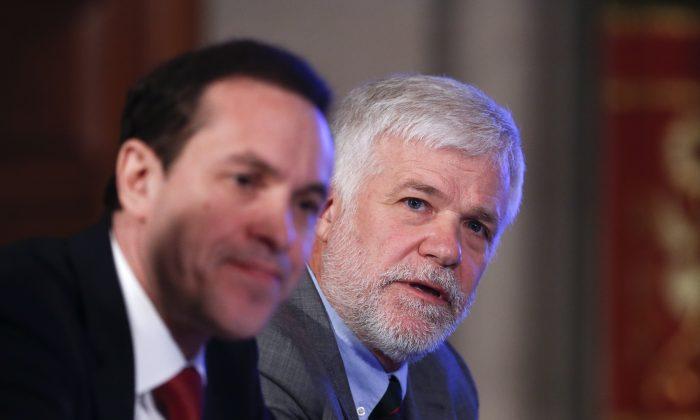ALBANY, N.Y.—Gov. Andrew Cuomo’s administration has moved to prohibit fracking in the state, citing unresolved health issues and dubious economic benefits of the widely used gas-drilling technique.
The announcement was made at a Cabinet meeting Wednesday when Environmental Commissioner Joe Martens and acting Health Commissioner Howard Zucker said they were recommending a ban, and Cuomo said he would defer to them.
Zucker and Martens summarized the findings of their environmental and health reviews, where they concluded that shale gas development using high-volume hydraulic fracturing carried unacceptable risks that haven’t been sufficiently studied.
Martens said the Department of Environmental Conservation will put out a final environmental impact statement early next year, and after that he'll issue an order prohibiting fracking.
The gas drilling boom in the Marcellus Shale, a rock formation underlying southern New York, Pennsylvania, Ohio, and West Virginia, was made possible by fracking, or high-volume hydraulic fracturing, which releases gas from rock by injecting wells with chemically treated water at high pressure.
The drilling technique has generated tens of billions of dollars and reduced energy bills and fuel imports in the region.
But it’s also brought concerns and sparked protests, over air and water pollution, earthquakes, property devaluation, heavy truck traffic, and health impacts.
New York has had a ban on shale gas development since the environmental review began in 2008.
Zucker said he had identified “significant public health risks” and “red flag” health issues that require long-term studies before fracking can be called safe. He likened fracking to secondhand smoke, which wasn’t fully understood as a health risk until many years of scientific study had been done.
Fracking risks cited in the report include air quality concerns, climate change concerns from an increase in atmospheric methane, water contamination both underground and surface, earthquakes that could be induced by fracturing, and stresses to the community, such as from road damage, noise, and odor.
Martens said the Department of Environmental Conservation will put out a final environmental impact statement early next year, and after that he'll issue an order prohibiting fracking.
Small Business Impact
Martens downplayed the loss of economic benefits the region may have gained from fracking. He argued that a number of factors combine to make the practice less beneficial than had been anticipated.
These include the low price of natural gas, the high local cost of industry oversight, and the large areas that would be off-limits to shale gas development because of setback requirements, water supply protections, and local prohibitions.
Micheal P. Durant, state director of the National Federation of Independent Business, speaks for hardware stores, hotels, and other small and independent businesses that would have serviced new workers in the area in the event of a fracking boom, and New York farmers who stood to gain plenty from leasing their land to oil and gas companies.
“For those farmers who are sitting on thousands of acres of land this is a gut wrenching horrible decision that was made,” Durant said.
Durant estimates each well could have employed 62 people, provided $2 million in tax revenues, and $3 million to $5 million in benefits for supply chain and service providers. A 2011 Manhattan Institute study, “The Economic Opportunities of Shale Energy Development,” estimated an end to the moratorium would have spurred over $11.4 billion in economic input.
In a telephone interview, Durant said the Cuomo administration ignored in its assessment the many studies that show the positive economic impacts of fracking, as well as the industry best practices that address health and environmental concerns.
Westchester County Executive Rob Astorino titled a statement to media: “Governor Cuomo to the Southern Tier: Drop Dead,” referring to parts of the state west of the Catskill Mountains that border Pennsylvania where fracking is allowed.
Astorino continued, “New York’s future just got bleaker with Governor Cuomo’s decision today to ban natural gas exploration in this state.”
As the Republican gubernatorial candidate against Cuomo in this year’s elections, Astorino ran on a campaign that challenged Cuomo’s position that New York’s economy is getting better. He also favored fracking.
“New York is blessed to have an abundance of this natural resource. It’s a shame Governor Cuomo won’t exhibit the leadership to do anything with it,” he stated, pointing out that natural gas exploration is being done safely in 35 other states under both Democrat and Republican governors.
Applause
A large number of New York elected officials and environmental groups issued statements in support of the administration’s decision.
“I strongly commend Governor Cuomo’s administration for making the right call to not frack in New York state,” said City Council Speaker Melissa Mark-Veverito. “It’s a great day for all of us who fought for years to ‘kill the drill,’” stated City Comptroller Scott Stringer.
“Never before has a state with proven gas reserves banned fracking. I believe that future generations will point to this day and say ‘This is when the tide began to turn against the dirty, dangerous and destructive fossil fuel industry,’” said Deborah Goldberg, managing director for Earthjustice. Goldberg was an attorney who represented the Town of Dryden, N.Y., in a precedent-setting case that banned fracking in the locality.
Emotions Run High
Cuomo said the debate over fracking was the “most emotional” he has had to deal with as governor, topping even such hot-button issues as same-sex marriage and gun control. He said the issue led to some heated encounters with people on both sides of the debate. Within 30 seconds of talking about fracking with opponents, tempers typically flared, Cuomo said.
“They’re not listening and they’re not hearing and they’re yelling,” he said. “You speak to the pro-frackers, same thing.”
Zucker said after studying all the analysis, for him it came down to one question: Would he want to live in a community that allows fracking? “My answer is, no” he said.
“We can’t afford to make a mistake,” Zucker said. “The potential dangers are too great.”
Cuomo referred to Wednesday’s presentation by his agency chiefs as “very factual,” but said he’s anticipating lawsuits being filed “every which way from Sunday” in an attempt to overturn the DEC’s decision to ban fracking.
“Do I believe the facts will trump all emotion? No,” Cuomo said.
The Associated Press contributed to this report.



Friends Read Free